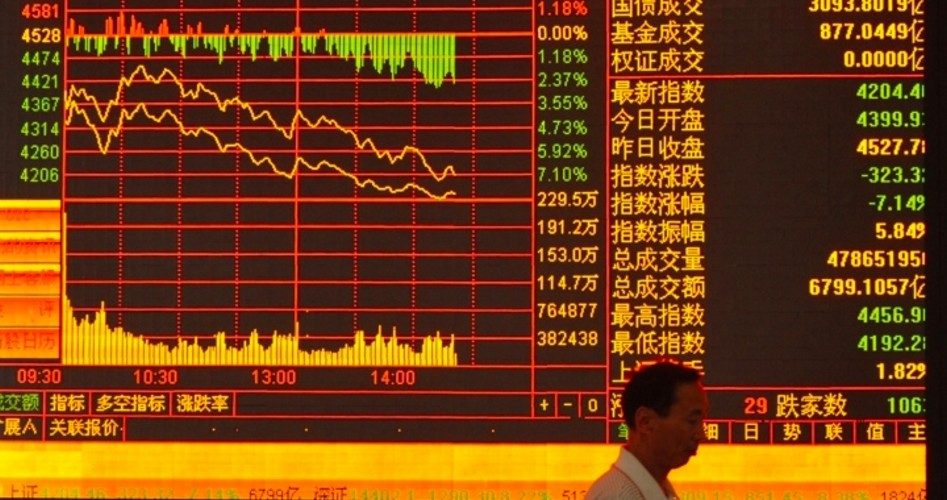
Since June 12 the Shanghai Index of Chinese stocks has lost 30 percent, thanks to losses on Friday of nearly six percent, and 12 percent for the week. That index, reflective of the Chinese stock market in general, exploded between November and June thanks to some 90 million newly minted Chinese investors entering the market for the first time, many of them with borrowed money, hoping to cash in on the rise.
Brokerage houses were only too glad to oblige, with many of them allowing new investors to borrow up to six times their initial equity position. As the market went almost vertical, commentators have been calling it a bubble, with prognosticators predicting its end sometime before 2016.
That may have been too hopeful: The end might already be underway. Huge players in the China market such as Bocom International Holdings have noted similarities between the Chinese stock market and other markets over hundreds of years that resulted in catastrophic crashes. And tellingly, Macquarie Investment Management, which manages nearly half a trillion dollars for its clients, has already liquidated all its China holdings.
Perhaps the key indicator that the bubble is bursting is the Chinese government’s response to it: denial, followed by making it even easier for investors to put new money into the markets. It also predictably blamed foreign interventionists such as George Soros and Goldman Sachs — “international capitalists” — for shorting the market (borrowing and then selling shares at current levels and then buying them back at lower prices later).
Thanks to margin debt, the China stock market’s total market capitalization has tripled in just the last year, pushing the revered price/earnings ratio (P/E, usually in the 10 to 20 range) to an ionospheric 84. Under regular rules, margin account holders must have at least $80,000 to open an account, and must add assets to their account if their collateral ratio falls below 130 percent. If they cannot meet that “margin call,” the brokerage will automatically liquidate their account.
But in an effort to push back the tide, Chinese officials have suspended most of those rules, leaving it up to the brokerage houses themselves to determine just how much cash an investor must have to open a margin account, and allowing margin accounts that are under water to remain active for as long as six months.
In the last week, those same officials have scrambled to make investing in the new bear market even more attractive. The “stamp duty” on share purchases was reduced, pension funds were urged to buy more equities, and interest rates were cut by the People’s Bank of China — the country’s equivalent to the Federal Reserve.
Chinese officials also urged investors facing potential losses to hang onto them for the sake of the country. As one cynic posted on his web page: “Hold stocks with confidence! Win glory for the country even if you lose the last penny!”
Perhaps the final blows arrived late in the week, sealing the fate of China’s stock market: Manufacturing was flat in the latest period, with the Financial Times noting that the disconnect between share prices and underlying values had made the market “more a game of Russian roulette now than a reasoned calculation of future share values.”
The kiss of death could arrive in the next few days as novice margin account holders start getting margin calls (now that the market has declined by 30 percent, triggering those calls). Forced selling into a declining market will exacerbate the decline, potentially turning last week’s 12-point drop into a stomach-churning rout.
To come back to earth, Chinese stocks would have to decline between 60 and 80 percent. If officials are able to stave off the decline this time, it will only serve to guarantee that losses in the future will be even greater. The stock market, like Mother Nature, is nothing to fool with, as 90 million new Chinese investors are about to discover.
Photo: AP Images
A graduate of an Ivy League school and a former investment advisor, Bob is a regular contributor to The New American magazine and blogs frequently at www.LightFromTheRight.com, primarily on economics and politics. He can be reached at [email protected].



